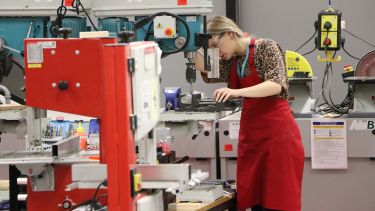- University of Sheffield has been listed among The Best Maker Schools 2021
- List highlights higher education institutions that encourage learning by doing and have excellent support and facilities for students to make outside of their studies
- The Best Maker Schools 2021 can help potential students with an interest in making as well as employers who are looking for candidates with 21st century skills
The University of Sheffield has been named as one of the best maker schools in the world in a new list published this month (October 2021).
The Best Maker Schools 2021, published by the American weekly news magazine Newsweek in collaboration with Make: - a publisher that was central to the maker movement - has named Sheffield among the top higher education institutions with curricula that encourages learning by doing.
The list is drawn from the maker movement - a culture that has seen people with an interest in using practical skills to create something new, or modify something old, come together to show off their creations and share ideas on how to make.
The list is intended to help potential students with an interest in making explore potential universities, as well as help employers who are looking for candidates with 21st century skills.
Institutions featured in the list have been highlighted for having educators who are committed to collaborative problem solving and have well-developed makerspaces, labs and studios.
The Best Maker Schools support diverse, interactive communities that engage in knowledge and skill sharing, demonstrate excellence in mentoring, guidance and coaching for making, and have spaces and tools that support independent, collaborative projects.
The list also highlights institutions for having innovative programs that demonstrate ingenuity and community engagement, the hallmarks of the maker movement.
Central to the maker movement at the University of Sheffield is The iForge - a 24-7 student-led makerspace that is the first-of-its-kind at a UK university, giving students the opportunity to collaborate, create and make outside of their academic studies.
Run by a team of engineering students who volunteer their time to mentor others and maintain the space, The iForge has a range of state-of-the-art equipment and materials that enables any student at Sheffield to create, and its open access approach has created a thriving community of hundreds of makers from across the University, working on anything from engineering prototypes to theatre props. The facility has links with industry and alumni to support networking and development and also runs special maker events throughout the year.
The iForge has been a springboard for a number of notable recent successes in prestigious student competitions, including students from Sheffield winning a UK rocketry championship, building an award-winning railway locomotive and designing, building and racing their own racing car, making history by becoming only the second British team to win the prestigious Formula Student UK competition at Silverstone earlier this year.
The University has recently set up new facilities for the student teams following their successes with support from generous alumni donations. The facilities are based in the University’s new Engineering Heartspace - a state-of-the-art social and learning space for students – and The iForge’s new Engineering Centre in the University’s George Porter Building, which provides space and resources for teams to work on student-led projects, such as building drones, planes, bionic arms and Mars rovers, and giving them access to cutting edge composites manufacturing.
Having established itself as a leader in making in higher education, the University of Sheffield has also established an international community of like-minded academics and students through its UNIMAKER conference, which has seen its student-led approach replicated at other institutions across the UK and in other countries across the world as far as Malaysia. Pete Mylon, Academic Lead for The iForge, is also helping to set up a makerspace in a refugee camp in Jordan as part of the Grantham Centre’s project to co-create sustainable solutions to life at the Zaatari refugee camp.
Pete Mylon said: “Making has always been at the heart of Sheffield as a city, and the facilities we have established have enabled us to build a community of makers that continues to grow and do more, whether it's assistive technology make-a-thons, jewellery workshops or launching rockets to 36,000 ft! This is what really makes Sheffield the place to come to in the UK if you love making, and it’s great to see this recognised by Make:, one of the founders of the global maker movement.”
The University’s School of Education has set up Maker{Futures} - a long-term programme that provides resources and support for students, educators and members of the public who are interested in setting up makerspaces in early years settings, schools, libraries, museums and community centres to foster creative learning environments. This includes a maker curriculum for schools and the Maker{Move} mobile makerspace that runs pop-up maker events in schools and community settings.
The programme also runs a large volunteer programme for students and academics at Sheffield wanting to support public and school engagement makerspace activities and events.
Dr Alison Buxton, Program Director for Maker{Futures} at the University of Sheffield, said: “It is important that we support the development of 21st century skills and mindsets such as problem finding and solving, analytical thinking and creativity in children and also support teachers to embed this into classroom learning. This is not just important for children wanting to pursue future careers in STEM, but are crucial skills across the jobs market.”
Sheffield is also the home of Hackcessible - a unique ‘make-a-thon’ event that brings teams of students together with disabled people to co-design and create products that can support their needs, giving the students valuable experience while providing custom solutions to unique accessibility challenges. Now in its third year, Hackcessible has expanded to include students from across the world, who will be working on challenges from musical instrument adaptation to nerve therapy devices.
Contact
For further information please contact:





